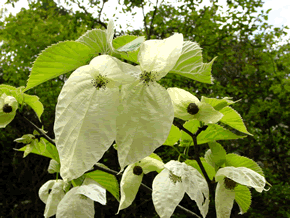Rare and endangered forest tree seeds from the Three Gorges area were carried into space by Shenzhou VII. The seeds are to be used for the first mutation breeding experiments in space, said Wei Ming, an officer of the China Astronaut Center on September 26.
 |
|
Davidia involucrata, called the Chinese dovetree or handkerchief tree, is an ancient deciduous species of the Tertiary period. [File photo] |
Liu Xianxin, the Director General of Yichang Municipal Forestry Bureau in Hubei Province, explained that nine varieties of endangered forest tree seeds from the Laoling Nature Reserve in Three Gorges were selected last year and sent to Beijing. Finally experts decided to experiment with two of them: Davidia involucrate and Liriodendron chinense, respectively listed for first- and second-grade state protection.
Davidia involucrata, called the Chinese dovetree or handkerchief tree, is an ancient deciduous species of the Tertiary period. Botanists also call it "the living plant fossil" and "the green panda".
Liriodendron chinense, the Chinese tulip tree, is a native Asian species in the Liriodendron genus. This indigent of central and southern China produces slightly larger and more deeply-lobed leaves and shorter inner petals in the flowers. It reaches about 40 meters tall and is a kind of rare shrub.
According to experts, space radiation, micro gravitation, high vacuum, high purity, large temperature difference and weak magnetic field - conditions which cannot be simulated on earth - will be used to produce gene mutations in the seeds. The mutated seeds will be selected and bred into new strains that can be planted over vast areas, producing durable and disease-resistant stock.
This space experiment will make a significant contribution to protecting and securing the country's ecology and biodiversity.
Other things that astronauts took with in Shenzhou VII included:
- five kinds of medicines, including the Taikong Yangxin Capsule for strengthening the heart, quick-dissolve oral tablets and pre-filled syringes for preventing space motion sickness, electrolyte drinks for relieving tiredness, and fortified water complements for medical use;
- food like chocolates and cakes;
- writing tools like anti-floating pencils and notebooks;
- toiletries like mouth cleanser and waste collecting bags;
- entertainment equipment like a palm computer with music, comics and an electric edition of their flight guide;
- lifesaving appliances such as a signal pistol, daggers, and shark repellent.
(China.org.cn by Zhou Jing September 27, 2008)